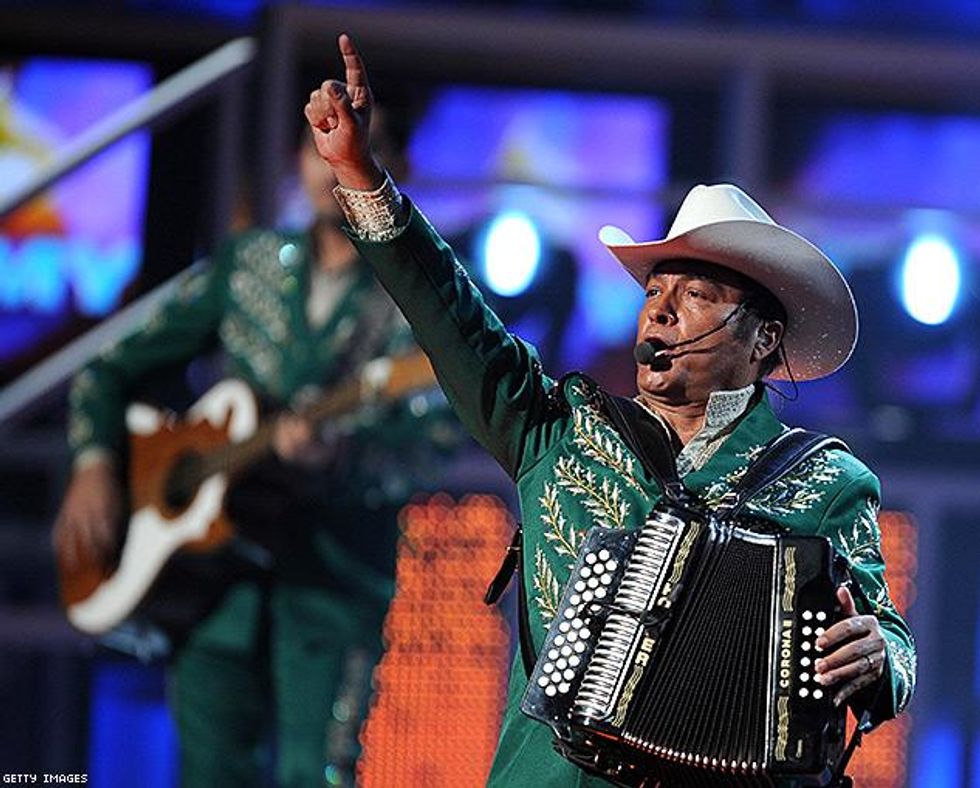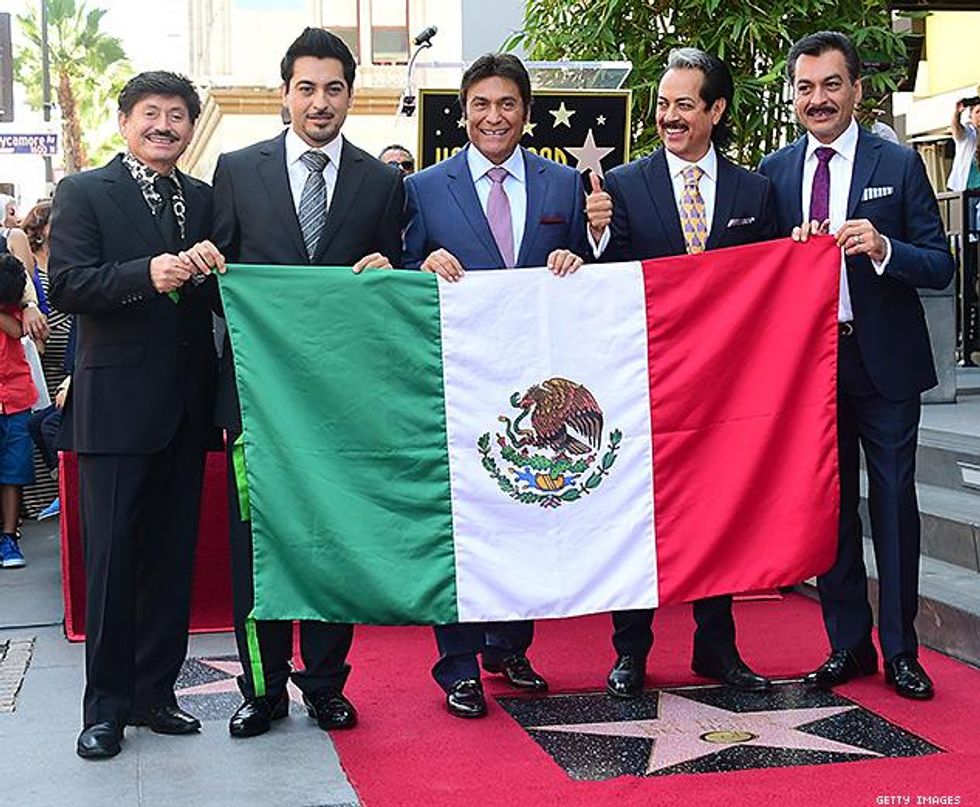 Los Tigres del Norte are making history today. The San Jose, Calif.-based norteno group are receiving a Special Recognition (Spanish Language) award from GLAAD for "Era Diferente," a song on their newest album, Realidades. The song is about a lesbian teenager who falls in love with her best friend. It's the first song about gay love in the band's 47-year history.
Los Tigres del Norte are making history today. The San Jose, Calif.-based norteno group are receiving a Special Recognition (Spanish Language) award from GLAAD for "Era Diferente," a song on their newest album, Realidades. The song is about a lesbian teenager who falls in love with her best friend. It's the first song about gay love in the band's 47-year history.
A household name in Spanish-speaking America, Los Tigres have sold more than 37 million albums worldwide, having written some of the most memorable and iconic corridos in the history of norteno music. They have six Grammys and six Latin Grammys and were recently honored with a star on the Hollywood Walk of Fame. The GLAAD award was unexpected, says lead singer and accordion player Jorge Hernandez, "I thought that no one would notice this song," he says. "When GLAAD called me, I thought it was very important that we are sending a message to the LGBT community."
"Era Diferente" translates to "She Was Different," and is about a young girl who struggles with boys fighting for her attention. "They make bets for her affection," sings Hernandez, "but none of them win her love ... She was so different from the other girls because she was never interested in a boy's love."
This is the first time a norteno group has ever penned a gay love song in the entire history of the genre, says Hernandez, who wrote the song. The impetus for the song came after gay fans began approaching Los Tigres members after performances and asking them, "Why don't you sing about us?"
"This interaction always stayed with me," Hernandez says, "and I had the idea that one day I would write a song that would talk about this type of relationship."
Los Tigres del Norte are known for penning corridos (ballads) about social issues, like "De Paisano a Paisano," which speaks of the criminalization of immigrants trying to make a living in America. In "Mis Dos Patrias," Los Tigres sing about the experience of maintaining loyalty to the performers' dual Mexican and American identities.
Many fans grew up watching the five-piece band perform on Spanish-language television in their matching sequined outfits, with cowboy hats (a trademark worn usually by Hernandez), cowboy boots, hand-sewn jackets, and vests. They've lived in the U.S. since the late 1960s, in the quiet suburbs of San Jose, where they first emigrated from Mexico.

Los Tigres are undeniably influential in the Spanish-speaking Latino community. "Part of the impact of norteno groups is that they are singing about things that are impacting people's day-to-day lives. For them to take a song like this as they have is really significant," says Chon Noriega, a professor in the UCLA department of film, television, and digital media at the University of California, Los Angeles. "They are as popular in the U.S. as they are south of the border ... they're not just appealing to Mexican or Mexican-American audiences," Noriega adds. "They're getting the full range of Spanish-speaking Latino populations around the country and around the hemisphere." Turn the dial to a Spanish radio station any day of the week, and it's very likely you will hear one of their songs.
In "Era Diferente," Hernandez sings about how people imagine that "ideal" love is between a male and a female and that those people may believe "other forms of love seem strange," but he counters that, "all that exists are currents of air and everyone should breathe their best wind." Hernandez says he loved writing this corrido because "this song has a message that transforms you."
Will we ever see a norteno singer come out as gay? "In norteno music, I don't know of anyone," Hernandez says, "but, of course, [that could be because] many people are closeted. I know they are out in other musical genres, and I don't know that anyone will come out anytime soon. It could come to light that someone has those feelings and they can be free to feel unashamed. The desire to declare your identity and to be unable to must be excruciating -- to know that you belong to one community and to publicly say you belong to another."
The men of Los Tigres are not young guys; most of the members are in their 60s. They come from a time and a genre where people have come to expect homophobia or machismo, but Hernandez says, "Sometimes in the Latino community we see machismo and problems with acceptance, but this is an area where acceptance is the most important because this is such a large community and we must accept people who love each other and live normal, happy lives." "Era Diferente" is part of Los Tigres' recent tour's live set list. "People request the song," Hernandez says. "The community is coming out to see us and this brings us great pride that these songs connect with them and brings them closer to us."
Hernandez wrote the lyrics to the song, but his brothers created the music. He wasn't satisfied with what they first provided him.
"When I first wrote the song and heard the melody, I thought, We need to make a couple changes here to give this song the strength it needs." After having written corridos for the better part of 50 years, Hernandez knows what makes people connect to a song.
"You can play around with a song, move the words around so that people can sing them aloud more easily," he says. "We hope to have the opportunity to continue making songs related to this community, who we have respectfully written this song for."


 Los Tigres del Norte are making history today. The San Jose, Calif.-based norteno group are receiving a Special Recognition (Spanish Language) award from GLAAD for "Era Diferente," a song on their newest album, Realidades. The song is about a lesbian teenager who falls in love with her best friend. It's the first song about gay love in the band's 47-year history.
Los Tigres del Norte are making history today. The San Jose, Calif.-based norteno group are receiving a Special Recognition (Spanish Language) award from GLAAD for "Era Diferente," a song on their newest album, Realidades. The song is about a lesbian teenager who falls in love with her best friend. It's the first song about gay love in the band's 47-year history.


































































Charlie Kirk DID say stoning gay people was the 'perfect law' — and these other heinous quotes